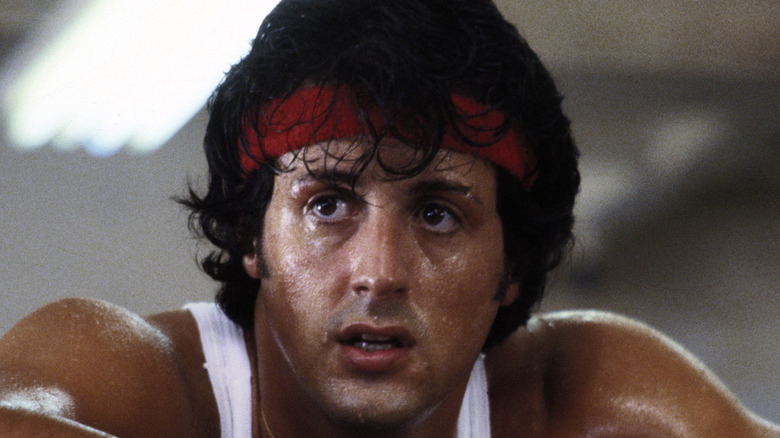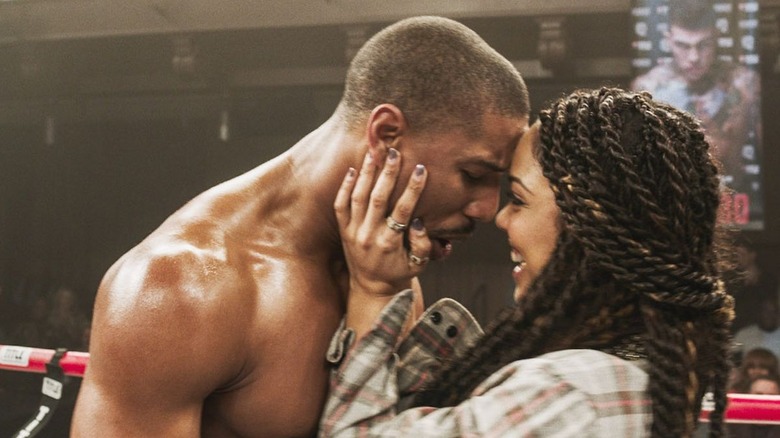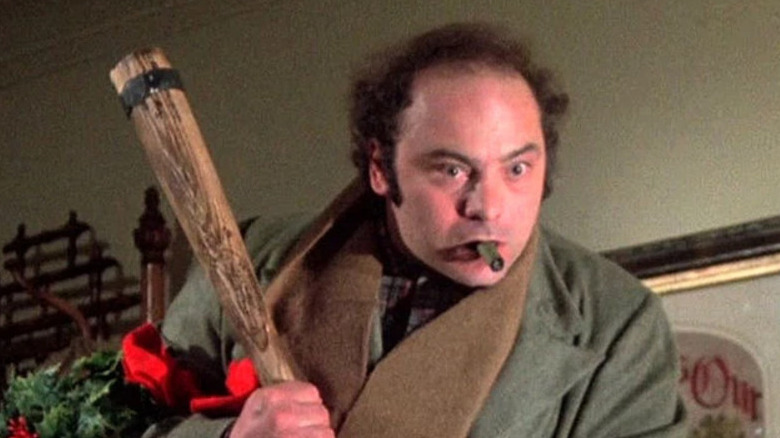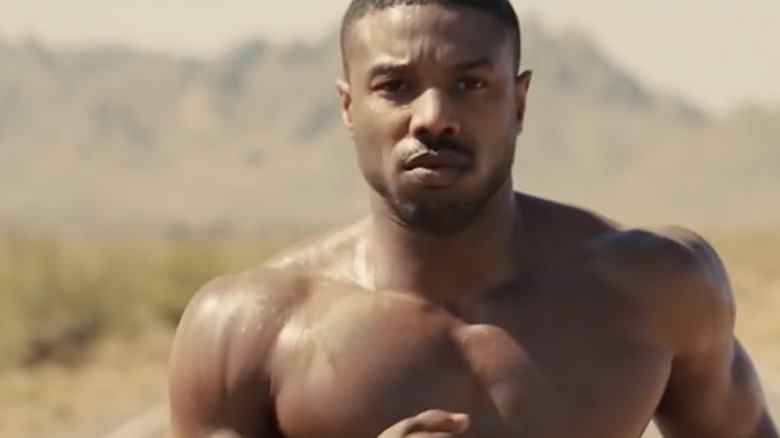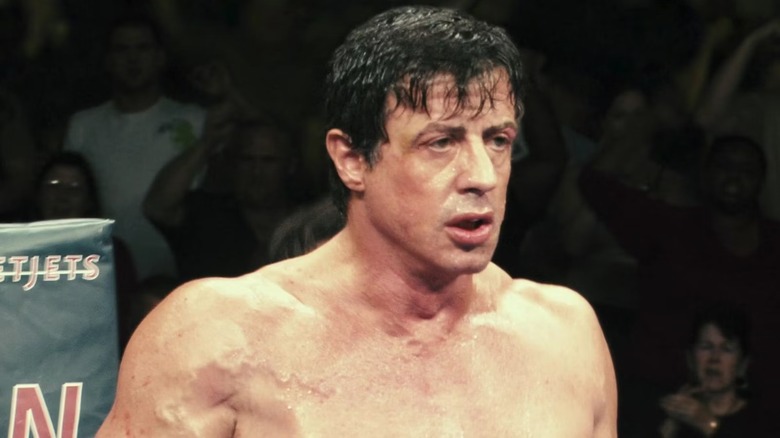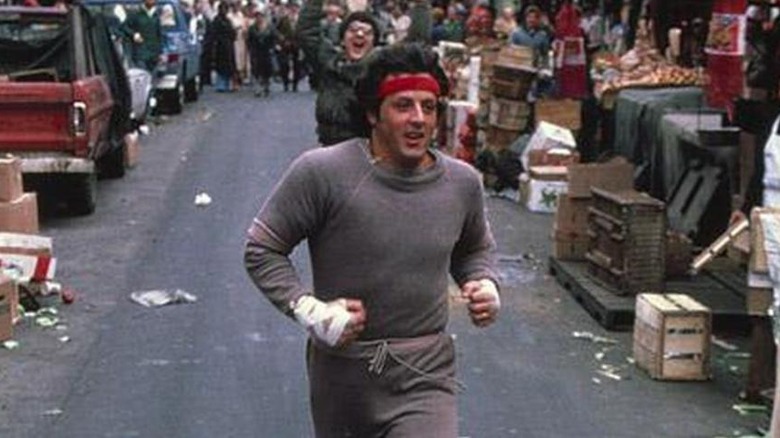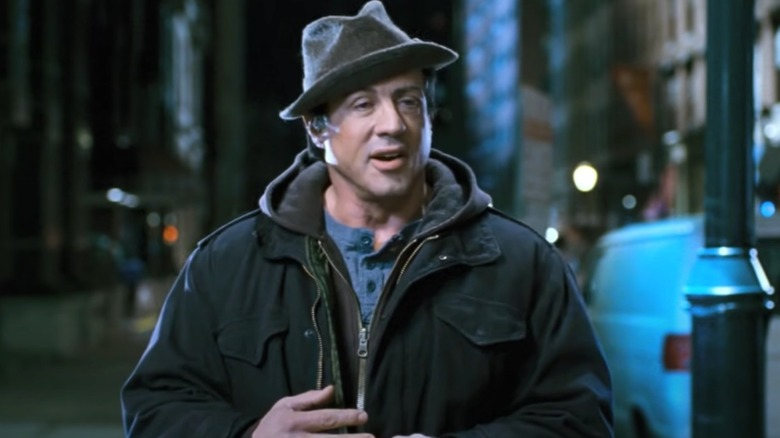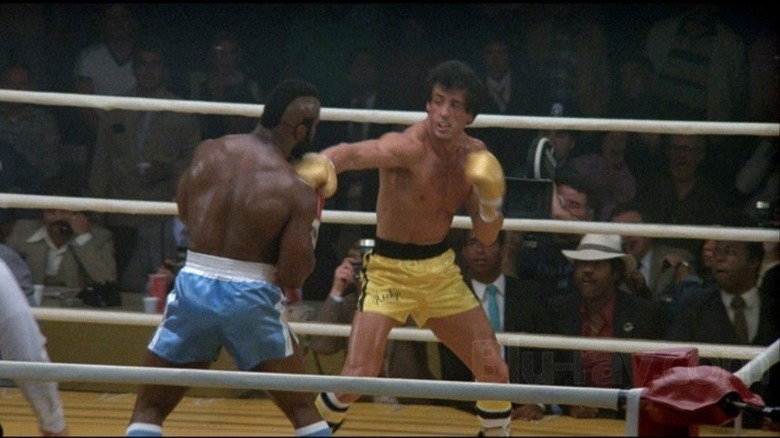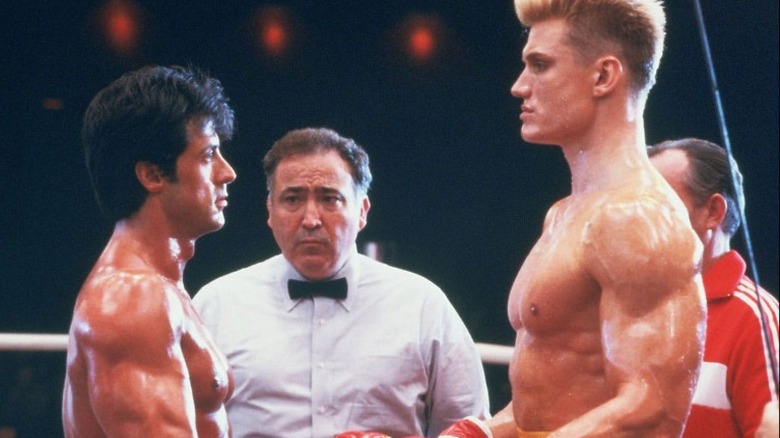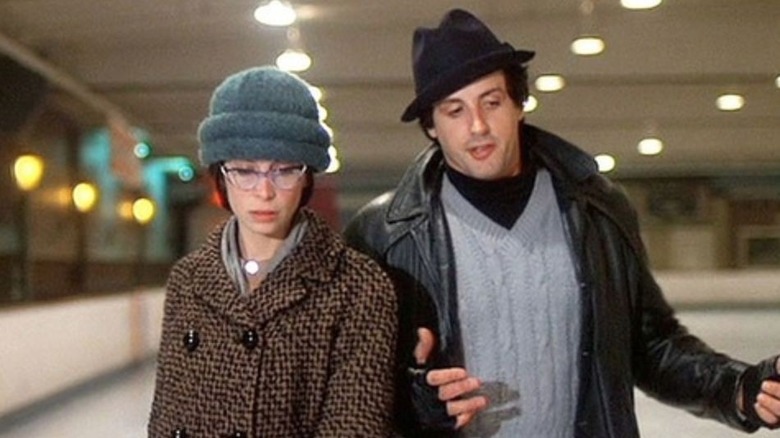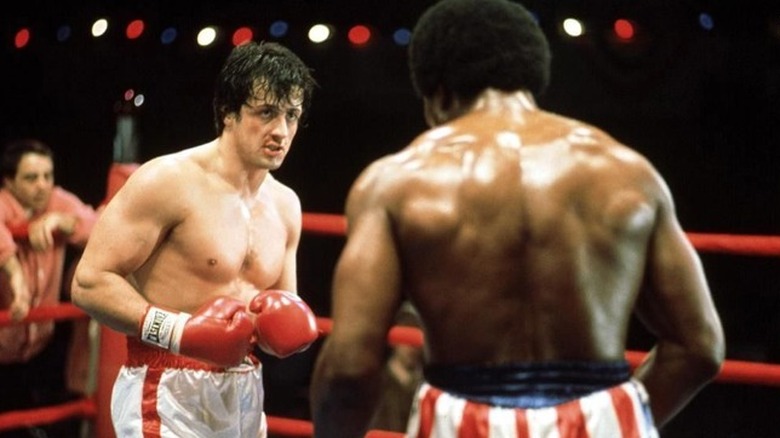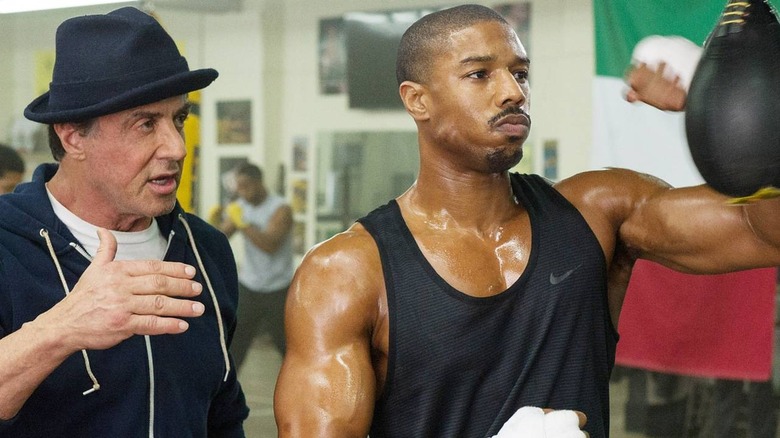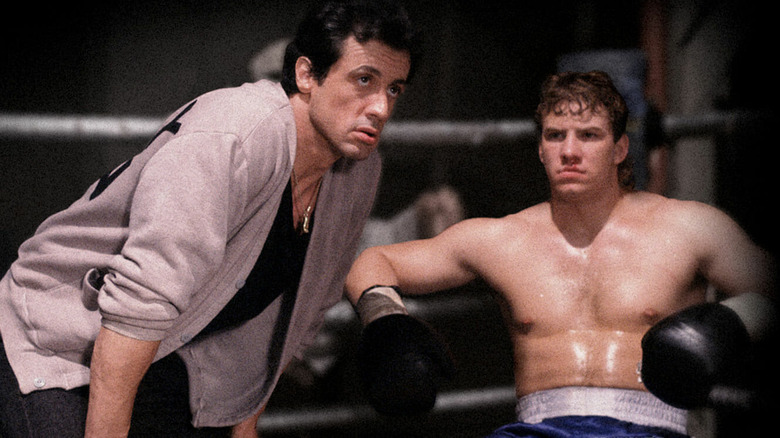The 6 Best And 6 Worst Things From The Rocky Franchise
The "Rocky" boxing movie series (and more recently, its spinoff "Creed" films) have been thrilling audiences to varying degrees since 1976. Typically featuring an underdog boxer taking on a memorably formidable opponent for the heavyweight championship title, the original film was written by and starred Sylvester Stallone (he was Oscar-nominated for each), and won best picture.
Following Philadelphia slugger Rocky Balboa (Stallone) — and later, his protege Adonis Creed (Michael B. Jordan) — the films have blended pugilist spectacle with earnest, fan-favorite characters. With over a half a dozen movies spanning some 40 years, the franchise has largely emerged as an enduring success — but, as with any long-running franchise, there have been missteps that at times seemed to threaten further installments.
Below are some of the best and worst things from the franchise, from inconsistent and abandoned plot lines to what has made the movies fly.
Best: The franchise never loses its sense of heart
The "Rocky" series has never been particularly hesitant to go bonkers with its fight sequences and some ludicrous premises for sequels. Yet, for all the stylized boxing matches and occasional leaps in logic, one thing the movies always keep sight of are the emotional core. This weight is what grounds the more outlandish elements of the series, fueling a genuine sense of investment in the stakes surrounding each fight.
Over the course of his character arc, Rocky starts a family and loses friends to the ravages of time and peril in the ring, with the Italian Stallion being pushed to his absolute personal brink. This journey through love and grief is echoed by Rocky's protege in the next generation, as Adonis and his girlfriend Bianca Taylor (Tessa Thompson) face and overcome their own personal challenges in Creed's boxing career. Even many of the franchise's antagonists get surprisingly emotional arcs themselves, exploring their own motivations and the fallout from their defeats in the ring. This distinction ranges from Apollo Creed (Carl Weathers) trying to prove he is still a formidable boxer to Ivan Drago (Dolph Lundgren) and his son Viktor (Florian Munteanu) contending with the consequences of Ivan's loss to Rocky in the '80s.
Worst: Paulie remains a problematic character
Not every character in Rocky's world has to be a lovable, working-class joe like himself but one character that has perhaps aged the worst is his brother-in-law and friend Paulie Pennino (Burt Young).
Introduced in the original film, it's Paulie that sets up Rocky with his younger sister Adrian (Talia Shire) only for the darker side of Paulie and Adrian's familial dynamic to emerge as she grows closer to Rocky. In one of the original film's most heated moments, a noticeably intoxicated Paulie gets into a yelling match with Adrian in front of Rocky on Thanksgiving, as it quickly becomes clear how controlling and abusive he is to his younger sister. This altercation is stopped by Rocky when Paulie moves to escalate the situation into physical violence, causing the boxer to intervene and defend Adrian.
Over the course of subsequent sequels, Paulie's characterization is lightened up considerably, remaining a fixture in Rocky and Adrian's lives though depicted as less abrasive, even becoming comic relief. However, there are still moments where Paulie shows problematic tendencies, from his continued fondness for booze to a heavy implication of racism in "Rocky III." A messy character that provides Rocky with gruffer, less enlightened companionship, even the Italian Stallion admits to Paulie being something of an acquired taste.
Best: The original soundtracks feature iconic hits
While most of the "Rocky" films boast a rousing score composed by Bill Conti — with "Rocky IV" scored by Vince DiCola and the "Creed" films scored by Ludwig Goransson — many of the movies feature solid original songs. The main "Rocky" theme, titled "Gonna Fly Now" and also composed by Conti, became the defining song of the franchise and topped the Billboard Hot 100 chart in 1977. The growing line of sequels and spinoffs would only continue to add to the franchise's strong musical legacy, each having major hit songs on their soundtracks that found greater success outside of the movies themselves.
"Rocky III" introduced audiences to "Eye of the Tiger" by the band Survivor, which echoed "Gonna Fly Now" by topping the Billboard Hot 100 chart in 1982, with the song going on to appear in "Rocky IV." A surprisingly robust list of popular artists would contribute to "Rocky" soundtracks, from John Cafferty and the Beaver Brown Band's "Hearts on Fire" in "Rocky IV" to Elton John's "Measure of a Man" in "Rocky V." By "Rocky Balboa," the franchise began to include hip hop artists onto soundtracks, with Three Six Mafia contributing to the 2006 film, while the "Creed" spinoffs released companion soundtracks compiling tracks by hip hop artists linked to each film.
Worst: The series tends to spin its own wheels
The "Rocky" movies work best when they proceed at a steady pace with a clear sense of purpose, building to the climactic bout that closes out each film. With the formula of the franchise becoming increasingly noticeable, this makes some of the more languidly-paced installments with longer runtimes more tedious.
In the end, audiences know that Rocky or Adonis are going to get into a big fight against an opponent telegraphed since the start of a given movie; this is a tried and true plot progression that has defined the series. The longer it takes for the characters in each movie to reach that inevitable conclusion, the clunkier the story comes across as it tries to fill its runtime.
The first sequel with this bad habit was "Rocky II," with the Italian Stallion attempting to leave behind his boxing career over health concerns before being bullied back into the ring by a vengeful Apollo for a rematch. "Rocky V" and "Rocky Balboa" both follow a similar premise, with Rocky contemplating his fighting future, either because of cranial trauma or advancing age as he confronts much younger opponents. The "Rocky" franchise is one that has followed a pretty predictable formula for years and, when the movies embrace it instead of trying to sell the idea of its protagonists avoiding a fight, they prove to be more effective.
Best: The training montages define a generation
From "The Karate Kid" to "Bloodsport," '80s sports movies prominently used training montages to show the improvement of their respective characters in their selected set of skills. Though montage sequences existed before "Rocky," the film series popularized the trope, with the "Rocky" franchise arguably using the narrative technique better than any of its contemporaries. The training montage is a "Rocky" staple, appearing in each of the movies, including the "Creed" spinoffs as Adonis undergoes his own rigorous training regimens and for good reason — they're immensely entertaining.
From Rocky running through the streets of Philadelphia to the uptempo sounds of "Gonna Fly Now" to climbing up a snowy Siberian mountain, the training montages are among the most recognizable scenes from "Rocky" movies. Aware of the effectiveness of the montages, "Rocky III," "Rocky IV," and "Creed II" all include multiple training sequences across each of their films. Among the '80s movie tropes lampooned in "Team America: World Police" is the training montage, with "Rocky" cited specifically and, to its credit, it is something the boxing series always delivered on.
Worst: There are several glaring plot holes
Although each of the main "Rocky" movies have been written by Stallone, there is a startling lack of consistency. This includes the timeline placement of each of the movies, with several sequels taking place immediately after the conclusion of the preceding film, with the resulting time jumps coming off as slightly jarring. The most egregious shift takes place with "Rocky V" starting moments after "Rocky IV" though Rocky and Adrian's son Robert (Sage Stallone) is visibly older than he had been in the previous film.
Other plot developments never addressed outside of the movies in which they appear are Rocky being virtually blinded in one eye in "Rocky II" and diagnosed for severe brain damage in "Rocky V." Instead, the Italian Stallion returns with a clean bill of health in each sequel, with no mention of the life-changing health adversity he faced. Once a plot-dictated challenge to Rocky has been presented and served its purpose within a single film, the franchise doesn't even bother with any sort of clear resolution that even a passing line of dialogue could fix.
Best: The fights are genuinely thrilling
With the "Rocky" franchise following two different boxer protagonists, the expectation behind the film series' boxing sequences are set particularly high, with each movie culminating in an extended fight scene. Fortunately, most "Rocky" movies contain memorable boxing matches, even if some are a bit over-the-top and not particularly realistic. An intense dedication to realism within the ring has never been an apparent priority for the movies, instead favoring entertainment and spectacle to great effect, with some of cinema's best fight scenes.
One of the more striking things about the franchise fight sequences is that they each feels quietly unique, in regards to style and presentation. From the painful gauntlet Rocky endures in "Rocky II" to the fast-paced brawl of "Rocky III" or the street fight in "Rocky V," the franchise knows to mix up its formula just enough to keep audiences riveted. The boxing scenes in "Rocky" might not strictly adhere to the letter of the sport itself, but they are crowd-pleasers that help define the genre.
Worst: The franchise's formula is incredibly predictable
The original "Rocky" is the story of an underdog with a heart of gold who gets a million-to-one shot at the big time and overcomes public and self-doubt to defy expectations. Effective and earnestly told, the premise has served the franchise well, though it also has become one of its biggest narrative traps. Even after Rocky and, later, Adonis win the heavyweight champion world title, every movie continues to portray them as an underdog, with odds riding against them, only to be fueled by love and emerge triumphant.
Each "Rocky" and "Creed" movie presents a clear central antagonist, as well as an argument why the protagonist is expected to lose; the hero is grounded in their relationship, training diligently before the big fight. Occasionally, to raise the stakes, the protagonist is brutally defeated halfway through the film by the antagonist, further fueling the rivalry, ahead of an epic rematch. Even the films where the protagonists ultimately lose the fight give them the moral victory, making the "Rocky" franchise burdened by predictability.
Best: The core love stories
While the "Rocky" franchise is about boxing, the heart secretly beating at its core is fueled by love stories surrounding the protagonists. Rocky Balboa and Adonis Creed are immensely dedicated men through and through, with their respective love for Talia and Bianca unwavering across the film series. The movies never lose sight of this distinction while adding elements that challenge these core relationships and force them to change and grow without overturning what made them special in the first place.
Audiences get to see Rocky and Adrian meet and go on their first date before getting engaged, married, and starting a family together with the birth of their son Robert. Along the way, the family endures Rocky confronting the very real dangers of his profession, financial hardship, and relocating back to Philadelphia, but their love remains as strong as ever. Even after Adrian's death, her presence looms large over Rocky, with the Italian Stallion constantly looking for solace and comfort from his late wife.
Similarly, audiences see Adonis meet Bianca after he moves to Philadelphia in the original "Creed," with the two quickly striking up a romance. Across the spinoffs, the young couple becomes engaged and has a daughter, growing closer over their daughter's health complications and Adonis' career. It is these two evolving relationships that provide the emotional investment audiences have in the franchise.
Worst: Rocky's fighting style is laughably bad
For all his training and experience in the ring, Rocky isn't a boxing genius that regularly outsmarts his opponents or gifted with superior speed that would make him untouchable. No, instead of relying on strategic wit and dexterity to win, Rocky perseveres largely on a superhuman endurance that has him wear out his opponents by serving as a human punching bag. Though the tactic clearly works in the Italian Stallion's favor in most of the movies, it is agonizing to see him not consider occasionally dodging or blocking incoming punches, if only for variety.
What makes this questionable fighting style all the more frustrating is "Rocky III" has Balboa learning how to become a quicker, more strategic boxer, using his new skills to completely dominate opponent Clubber Lang (Mr. T). However, by the big fight in "Rocky IV," the Italian Stallion has already ditched his newly-minted fighting prowess, returning to his usual style of being pummeled mercilessly by his opponent. While Adonis is a more competently imagined boxer, the legacy of Rocky's uniquely messy fighting style is one that hangs over the franchise for pugilist purists.
Best: Rocky and Adonis as characters
The only reason the "Rocky" franchise works is because it has such charismatic, determined protagonists that carry the films. The underdog everyman leading these movies is engaging, earnest, and heartfelt, given clear motivations and relatable character arcs even as the stakes escalate. A lot of this comes from Stallone writing, starring — and in multiple instances, directing — the film series, maintaining a consistency in artistic vision.
Stallone's performances as Rocky never feel dialed-in, but feature some of his finest work on screen, with Stallone nominated for two separate Academy Awards for playing Rocky Balboa. Similarly, Jordan's performances as Adonis Creed stand as some of the best in his career, breathing new life into the venerable franchise. The entire enterprise rests on Stallone and Jordan and, fortunately, both actors deliver.
Worst: Rocky V nearly ended the franchise with forced tragedy
The most maligned installment in the franchise is undoubtedly "Rocky V," which features the series' lowest critical and audience rating on Rotten Tomatoes (both around 30 percent), did poorly at the box office and nearly derailed the franchise for good.
Taking place in the immediate aftermath of its predecessor's climactic bout in Moscow, Rocky discovers he is suffering from brain damage, forcing an early retirement from boxing. Making matters worse, the Balboa family returns home to find that their unscrupulous accountant has completely bungled their finances, making them fiscally destitute.
While this premise was meant to return Rocky and his family to their working class roots, it comes across as hopelessly contrived — and with a dark ending initially planned. Rocky, a beloved athlete coming off a publicly broadcast bout against Drago, is supposed to be unable to find a lawyer who can reverse his fortunes or a fanbase who'd assist with his financial woes, a la Willie Nelson. It's a head-scratcher, and what's worse is that the tragic twist undercuts the triumphant highs of "Rocky IV," now that we know what's coming for the Balboa family just around the corner.
